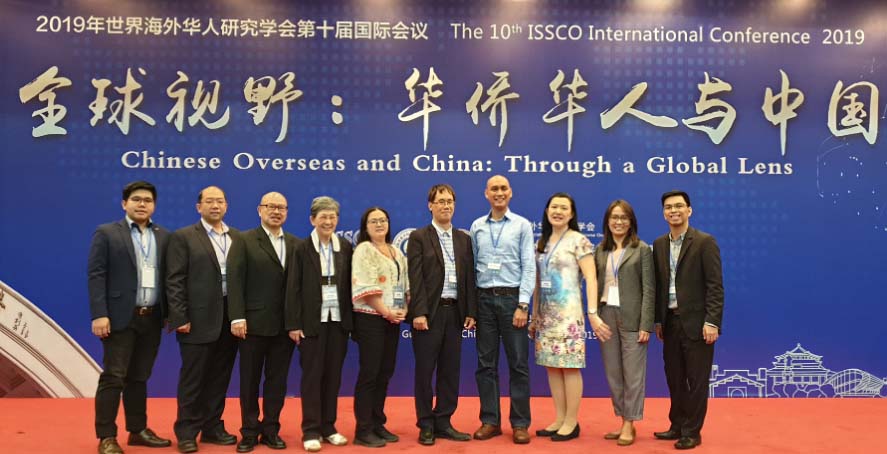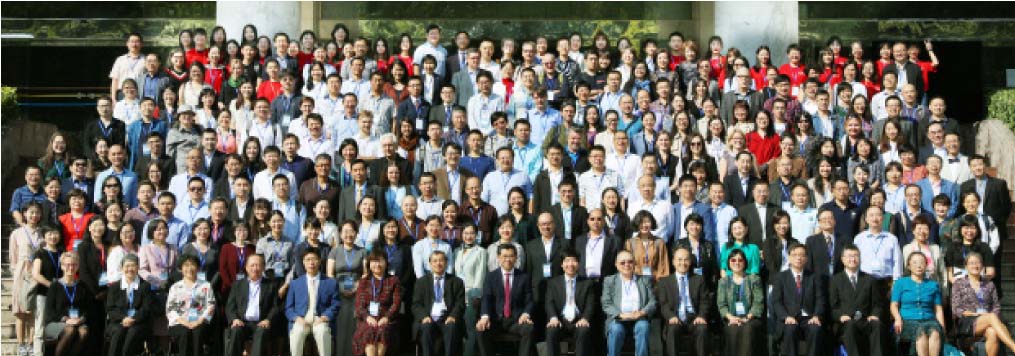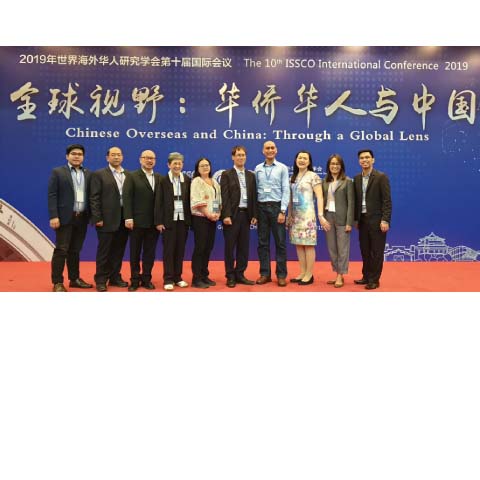
Found all over the world, people of Chinese ancestry can help their adopted countries reach better understanding and cooperation with China and Chinese overseas.
This was the general consensus at an international conference – with nearly 280 scholars from 30 countries – held in China last November. It was the 10th such conference by the International Society for the Study of Chinese Overseas (ISSCO 世界海外華人研究學會) held this time in Jinan University, Guangzhou.
Its theme was “Chinese Overseas and China: Through a Global Lens (全球視野:華僑華人與中國). Four significant speakers – including the host and those who delivered welcome remarks – emphasized the importance of supporting research and enhancing the understanding of Chinese overseas, especially during the current period of globalization and China’s internationalization. The significant roles of Chinese overseas as bridges of cultural and economic exchanges between China and their host countries, as well as between Chinese communities in all parts of the world, cannot be overemphasized.
This message was taken up during the opening plenary, where five internationally-renowned speakers set the tone for successive panels and discussion. The five, all experts in the study of Chinese overseas in their particular regions, spoke of developments in Chinese overseas communities and their relationships with China from their particular lenses in America, Europe, Asia, Australia and Africa.
Speakers at the international conference spoke of China’s development, and its positive impact in their own regions, in both the eastern and western hemispheres. They also touched the various issues and problems that arose from fear and suspicion of China’s growing influence on the world stage.
They emphasized the need for more dialogues and fora between different parties – of Chinese ancestry and otherwise. The activities will improve understandings of China’s domestic and international politics and policies.
The plenary discussions set the tone for the panel discussions afterward, where diverse aspects of the lives of Chinese overseas were discussed in greater detail.
These are: language and education, culture and communication, religion and religious beliefs, literature, history and contemporary China, identity, returned overseas Chinese, hometown research, China’s Chinese overseas affairs policy, museums and research centers, transnational mobility and talent migration, communities and nation-state, entrepreneurship, marriage and kinship and many other issues.
The sessions highlighted the latest research trends on Chinese overseas studies, offered new ideas and perspectives, and explored opportunities, challenges and prospects for future development in this field.
Issues arising from China’s emergence as a world power, the competition between China and the United States, new immigrants and their conflict with descendants of early Chinese immigrants who are now deeply rooted in the lands of their births were topics that attracted considerable attention from the conference’s participants.

Diverse opinions were offered at the panel on Chinese overseas affairs and the relationship between Chinese overseas and China (僑務). Chinese scholars who presented their papers saw the participation of Chinese overseas communities in politics and civil society in the context of their supposed ancestral or mother country, China. This topic included discussions on China’s policy of enticing new talent pools from Chinese overseas communities as part of its growth strategy.
The Philippine delegation made an impressive showing when it fielded the highest number of participants who shared their research on the Chinese in Philippine life, museums and research centers, terrorism, race relations, and Chinese-language education.
One panel was convened by Dr. Jely Galang of the University of the Philippines, one by Dr. Rommel Banlaoi of Miriam University, and another was jointly convened by Dr. Tan Cheebeng (陳志明) of Sun Yat-sen University, and this author.
The concluding plenary followed two days of thought-provoking presentations and lively discussions. It highlighted the need to widen the scope and reach of the study of Chinese overseas, to better understand new developments, challenges and issues facing Chinese overseas communities worldwide.
As such academic institutions, such as ISSCO, continue to be relevant, and research efforts of its members need continuing support from their own organizations.
Closing remarks were delivered by Prof. Li Shengsheng (李勝生), Academic Fellow of the Royal Academy of Canada and lifetime honorary professor of Sociology at the University of Saskatchewan; Prof. Zhang Zhenjiang (張振江), dean of Jinan University School of International Studies/Academy of Overseas Chinese Studies, who hosted the conference; and Dr. Li Minghuan (李明歡) of Xiamen University and visiting professor at Jinan University School of International Studies and Academy of Chinese Overseas Studies.
After the closing plenary, ISSCO’s general membership elected its new board to serve from 2019 to 2021. Li became its new president, Prof. Mette Thunoe of Aarhus University in Denmark was elected vice president, Ho Khai Leong (何啓良) of Peking University, secretary, and Wang Wei (王維) of University of Nagasaki, treasurer.
The international conference this year welcomed participants from nations in North America, Latin America, Europe, Pacific, Asia and Southeast Asia. There were 230 papers submitted: 125 in Chinese, 105 in English. Two hundred were presented in 55 parallel panels.
The conference was convened by Jinan University School of International Studies
(暨南大學國際關係學院), the Academy of Overseas Chinese Studies (華僑華人研究院), and the Academy of Overseas Chinese Studies of China (中國華僑華人研究所).
Organizers hoped to encourage further exchanges and cooperation between academic circles and expand the international influence of the research on Chinese overseas.
Prof. Zhang Zhenjiang hosted the conference, and Tan Cheebeng, ISSCO president at the time, was convenor. They welcomed guests and participants during the opening ceremony. Prof. Lin Rupeng (林如鵬), secretary of the Party Committee of Jinan University, and Zhang Chunwang (張春旺), director of the Academy of Overseas Chinese Studies of China, delivered the opening remarks.
The five plenary speakers were Prof.Wang Ling-chi (王靈智) from UC Berkeley, United States; Thunoe; Prof. Leo Suryadinata (廖建裕) from the Institute of Southeast Asia Studies, Singapore; Prof. Kee Pookong (紀寶坤) from the University of Melbourne; and Prof. Li Anshan (李安山) from Peking University.
The ISSCO international conference is held every three years. Past international conferences were held in San Francisco, Hong Kong, Manila, Taipei, Copenhagen, Singapore, Beijing, Kuala Lumpur and Vancouver.
It is one of the most well-attended international conferences. Regional conventions are held in between the international ones.
The regional conference in 2021 will be at the Center for China and Globalizing Asia Studies in Mahidol University, Bangkok, Thailand on Nov 6-8, 2020.
A call for papers will be announced soon. Please send inquiries to [email protected].





